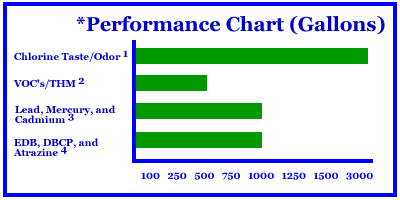PRODUCT LAB TESTING and REVIEWS
Heavy Metal Reduction Testing
The CB-0.5 "Dual Media" Cartridge is designed for multi-purpose filtration
of liquids. It contains a powdered activated carbon (PAC) briquette, which
is more effective at reducing levels of VOC's and certain pesticides than
granular activated carbon. In addition, the carbon briquette reduces levels
of chlorine, sediment down to 0.5 micron, and Clardia and Cryptosporidium
cystst.
The cartridge also contains a specially designed resin which reduces certain
heavy metals such as lead, mercury, and cadmium. The design ensures that the
water passes through three steps of filtration. In the first step, the
polypropylene prefilter reduces coarse sediment particles. In the second,
the PAC briquette absorbs chlorine, certain organic contaminants, and
absorbable metals, as well as filtering particles down to 0.5 micron in
size. A directional flow tube guides the water through the entire length of
the resin bed, ensuring maximum contact. In the third and final step, the
resin greatly reduces lead and certain other heavy metals that may be
present in the water.
Percent Heavy Metal Reduction
Tested through 1000 Gallons (3795 Liters)
Lead.......................................> = 96%
Cadmium..................................> = 91%
Mercury..................................> = 93%
Performance Chart

1. Exceeds NSF Standard No.42 for chlorine/taste and odor reduction,
Appendix B
(June 1988 Ed.)
2. > = 83-99% reduction; tested according to NSF Standard 53, chloroform
surrogate test, Appendix B (May 1990 Ed.)
3. > = 91-96% reduction; tested according to NSF Standard 53, metal
reduction test, Appendix B (May 1990 Ed.)
4. > = 97-99% reduction; tested according to NSF Standard 53, Appendix B
(May 1990 Ed.)
+ - Glardia and Cryptosporidium cyst claim based on actual tests, showing
greater than 99.9% reduction of live Cryptosporidium parvum cysts which are
smaller than Giardia cysts. Tested according to US-EPA "Guide Standard and
Protocol for Testing Microbiological Purifiers"
Note: All of the above tests conducted at 0.6 gallons per minute

